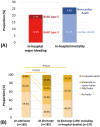Outcomes of Elderly Patients With Acute Myocardial Infarction and Heart Failure Who Undergo Percutaneous Coronary Intervention
- PMID: 36304433
- PMCID: PMC9535130
- DOI: 10.1253/circrep.CR-22-0048
Outcomes of Elderly Patients With Acute Myocardial Infarction and Heart Failure Who Undergo Percutaneous Coronary Intervention
Abstract
Background: As life expectancy rises, percutaneous coronary intervention (PCI) is being performed more frequently, even in elderly patients with acute myocardial infarction (AMI). This study evaluated outcomes of elderly patients with AMI complicated by heart failure (AMIHF), as defined by Killip Class ≥2 at admission, who undergo PCI. Methods and Results: We retrospectively analyzed 185 patients with AMIHF aged ≥80 years (median age 85 years) who underwent PCI between 2009 and 2019. The median follow-up period was 572 days. The rates of in-hospital major bleeding (Bleeding Academic Research Consortium Type 3 or 5) and in-hospital all-cause mortality were 20.5% and 25.9%, respectively. The proportion of frail patients increased during hospitalization, from 40.6% at admission to 59.2% at discharge (P<0.01). The cumulative incidence of all-cause mortality was 36.3% at 1 year and 44.1% at 2 years. After adjusting for confounders, advanced age, Killip Class 4, final Thrombolysis in Myocardial Infarction flow grade <3, and longer door-to-balloon time were associated with higher mortality, whereas higher left ventricular ejection fraction and cardiac rehabilitation were associated with lower mortality (all P<0.05). Progression of frailty during hospitalization was an independent risk factor for long-term mortality in hospital survivors (P<0.01). Conclusions: The management of patients with AMIHF aged ≥80 years who undergo PCI remains challenging, with high rates of in-hospital major bleeding, frailty progression, and mortality.
Keywords: Acute myocardial infarction; Elderly; Frailty; Heart failure; Percutaneous coronary intervention.
Copyright © 2022, THE JAPANESE CIRCULATION SOCIETY.
Conflict of interest statement
The authors declare that there are no conflicts of interest.
Figures




References
-
- Desta L, Jernberg T, Löfman I, Hofman-Bang C, Hagerman I, Spaak J, et al.. Incidence, temporal trends, and prognostic impact of heart failure complicating acute myocardial infarction. The SWEDEHEART Registry (Swedish Web-System for Enhancement and Development of Evidence-Based Care in Heart Disease Evaluated According to Recommended Therapies): A study of 199,851 patients admitted with index acute myocardial infarctions, 1996 to 2008. JACC Heart Fail 2015; 3: 234–242. - PubMed
-
- Bahit MC, Lopes RD, Clare RM, Newby LK, Pieper KS, Van de Werf F, et al.. Heart failure complicating non-ST-segment elevation acute coronary syndrome: Timing, predictors, and clinical outcomes. JACC Heart Fail 2013; 1: 223–229. - PubMed
-
- Ibanez B, James S, Agewall S, Antunes MJ, Bucciarelli-Ducci C, Bueno H, et al.. 2017 ESC guidelines for the management of acute myocardial infarction in patients presenting with ST-segment elevation: The Task Force for the management of acute myocardial infarction in patients presenting with ST-segment elevation of the European Society of Cardiology (ESC). Eur Heart J 2018; 39: 119–177. - PubMed
-
- Fukutomi M, Nishihira K, Honda S, Kojima S, Takegami M, Takahashi J, et al.. Difference in the in-hospital prognosis between ST-segment elevation myocardial infarction and non-ST-segment elevation myocardial infarction with high Killip class: Data from the Japan Acute Myocardial Infarction Registry. Eur Heart J Acute Cardiovasc Care 2021; 10: 503–512. - PMC - PubMed
-
- Kojima S, Nishihira K, Takegami M, Nakao YM, Honda S, Takahashi J, et al.. Nationwide real-world database of 20,462 patients enrolled in the Japanese Acute Myocardial Infarction Registry (JAMIR): Impact of emergency coronary intervention in a super-aging population. Int J Cardiol Heart Vasc 2018; 20: 1–6. - PMC - PubMed
LinkOut - more resources
Full Text Sources
Research Materials
Miscellaneous

